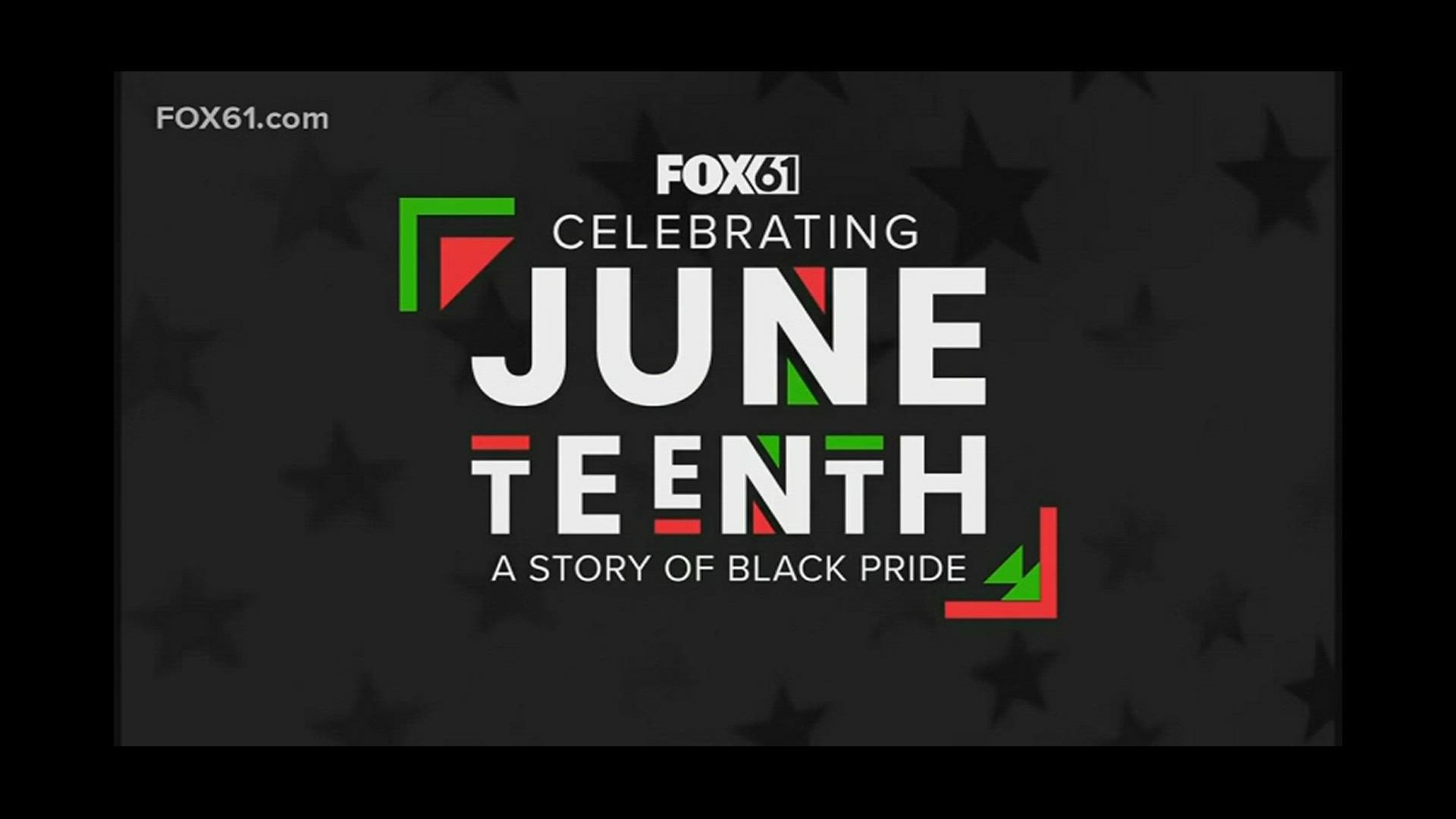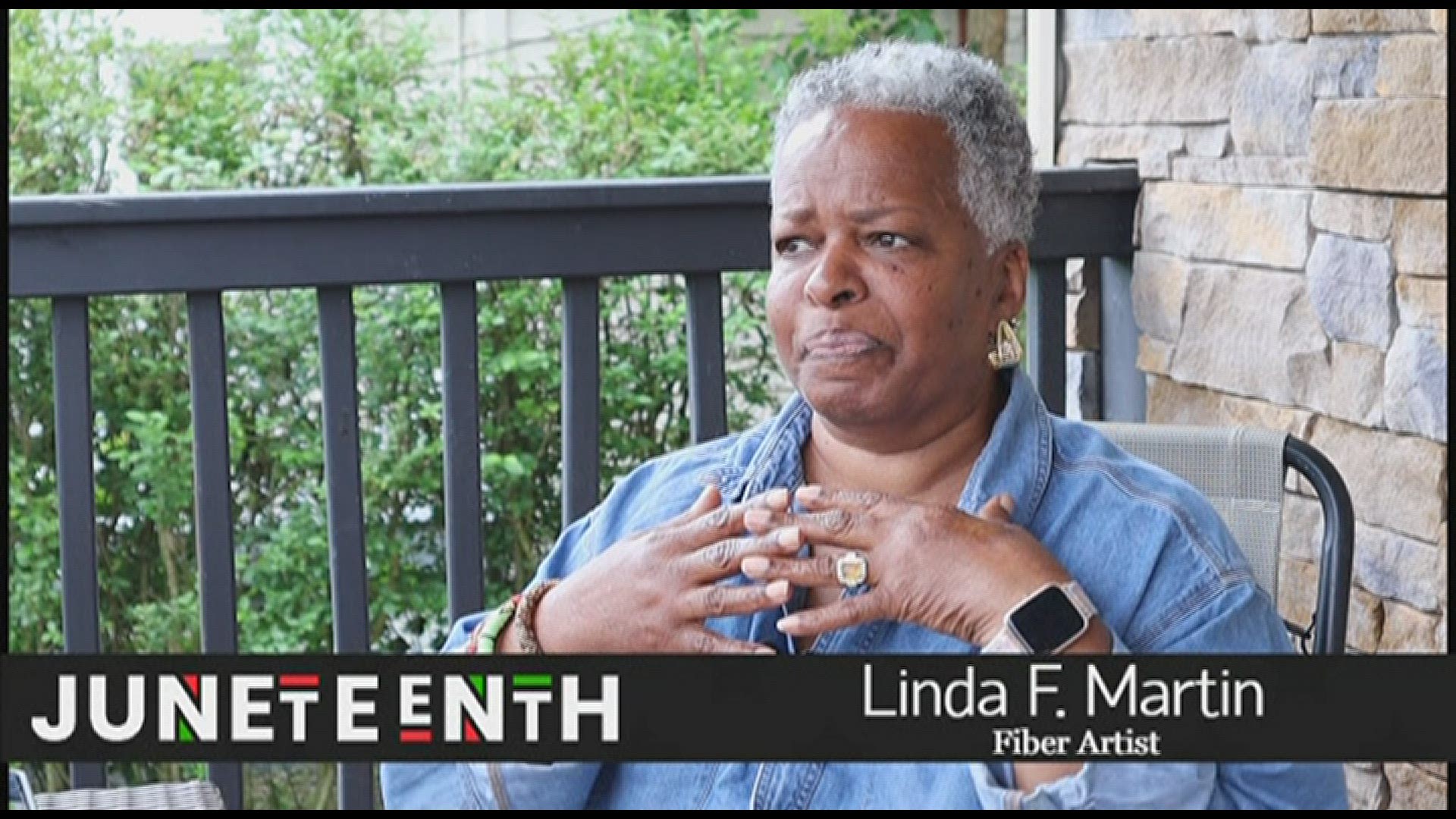Celebrating Juneteenth: A Story of Black Pride
Community members and Black leaders across the state reflect on Juneteenth and Black Excellence.
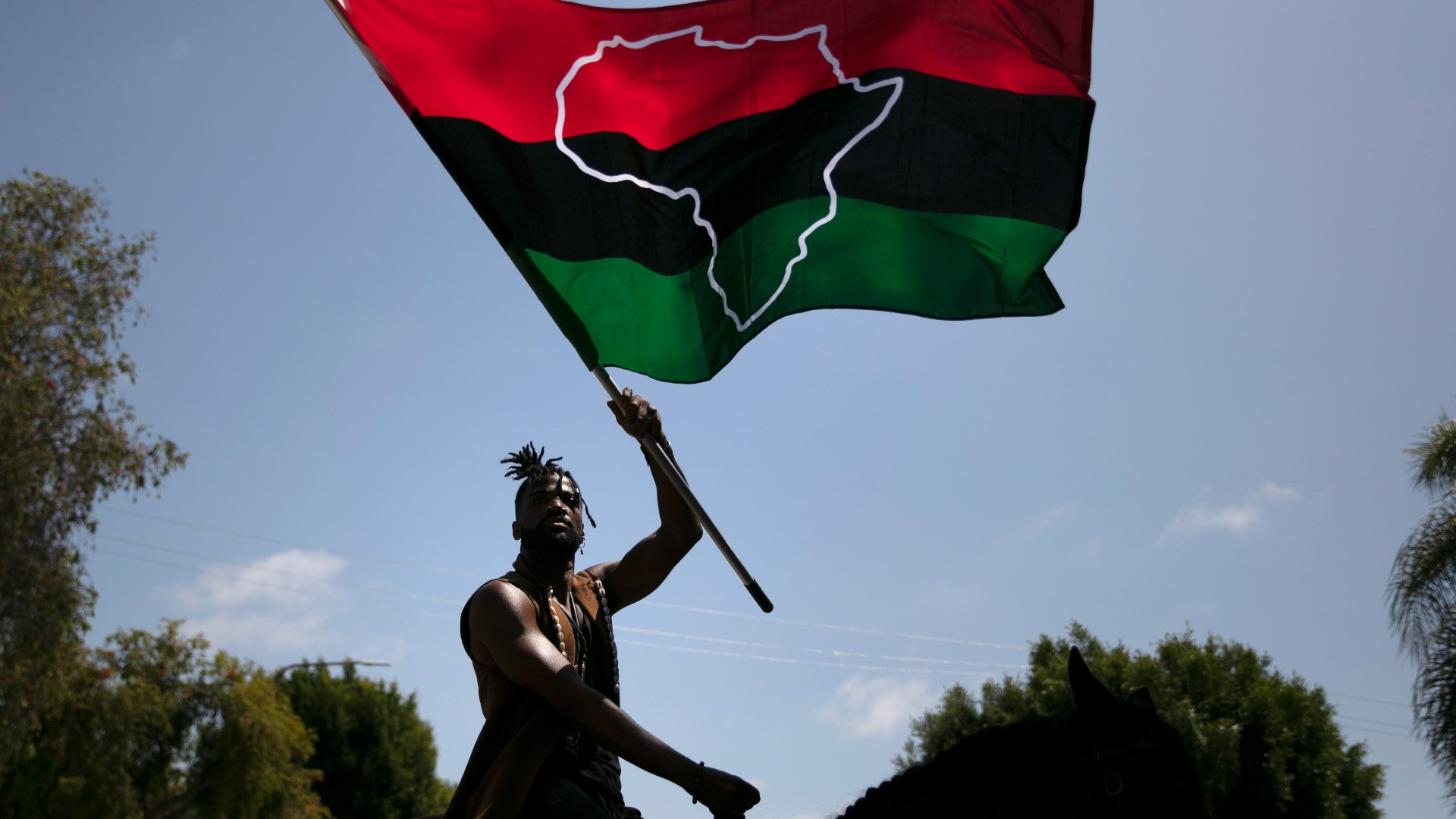
Juneteenth, also known as “Freedom Day,” is the commemoration of the end of slavery in the United States.
The end of slavery is often recognized as when the Emancipation Proclamation was signed by Abraham Lincoln in 1863; however, Juneteenth recognizes when the last slaves were actually told about the president's order.
Story of Juneteenth

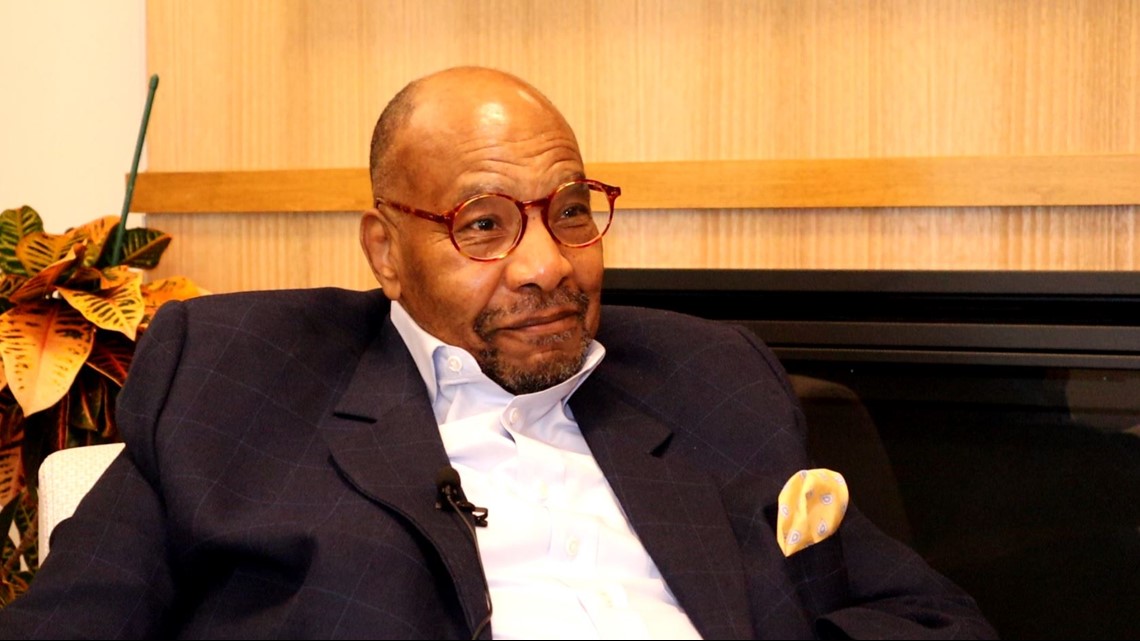
On Saturday, millions across the world will commemorate the 156th anniversary of Juneteenth.
June 19 marks the actual end of slavery in America.
On that day in 1865, Union soldiers – led by Major General Gordon Granger – rode into Galveston, Texas.
It was there that he announced the Civil War had ended and read General Order No. 3., which stated: All enslaved people are free.
While President Lincoln's Emancipation Proclamation became official on Jan. 1, 1863, those still enslaved in Texas had not yet received that information.
“The fact that the people of Texas did not share the news that the emancipation had been declared, it is one of the dastardly and horrendous acts in our history,” African American Studies professor and historian, Dr. Benjamin Foster, told FOX61 News.
General Robert E. Lee's surrender on April 9, 1965, ending the U.S. Civil War and Granger's arrival in Texas allowed Union troops strong enough to enforce the Executive Order signed more than two years earlier.
While celebrations were jubilant among formally enslaved people after the announcement, Dr. Foster noted that former slave owners and others in Texas resented their emancipation.
“They treated them very harshly, bodies could be found hanging on trees or floating in rivers,” he added.
However, the newly freed slaves marked the occasion by dressing up, singing spirituals, hearing sermons, enjoying traditional delicacies and prayers.
The name Juneteenth comes from a blending of the date. The holiday serves as an opportunity to cherish freedom, but also poignantly acknowledge the history of slavery in the country.
More than 150 years later, Juneteenth remains a day that is observed by millions across the country.
President Biden signed a bill Thursday, officially declaring June 19 a federal holiday.
Juneteenth became the country's 12th federal holiday.
In Connecticut specifically, Gov. Ned Lamont officially declared the date as Juneteenth Day in 2020.
"But simply recognizing a day and educating people about our country's history is not enough,” Lamont said after issuing the state Proclamation. “We must do more. We must take action to reach the goal of a more equal and just society.”
When asked why it is important for everyone to recognize and celebrate Juneteenth, Dr. Foster explained that it is simply the right thing to do.
“From my perspective, it’s the recognition of the humanity of a people who have given so much to this nation,” Foster said.
He continued: “In every war or conflict that the nation has been involved in, African Americans have participated. African Americans were the first agricultural laborers that helped the nation begin economically viable.”
Dr. Foster noted that African people were the producers of the three major crops - tobacco, rice and cotton.
However, he said the significance goes beyond the times of slavery.
“When you go on to look at all the inventions and other contributions that people of African descent have made to these United States; by celebrating an end to a most inhumane act, is just the right thing to do,” he concluded.
Ancestor's journey to freedom
Juneteenth is a day to celebrate the official end of slavery in America. “Freedom Day” is also a time to remember the ancestors who endured the darkest period in American history and paved the way for generations to come.
Linda F. Martin, a more than 20-year resident of Hartford, is doing just that.
As a proud homeowner in the north end of the capital city, Martin said purchasing her 120-year-old home on Cleveland Avenue was the best decision she’s made.
However, Martin’s ties to Connecticut and Hartford specifically, date back far before she closed the deal in 1988.

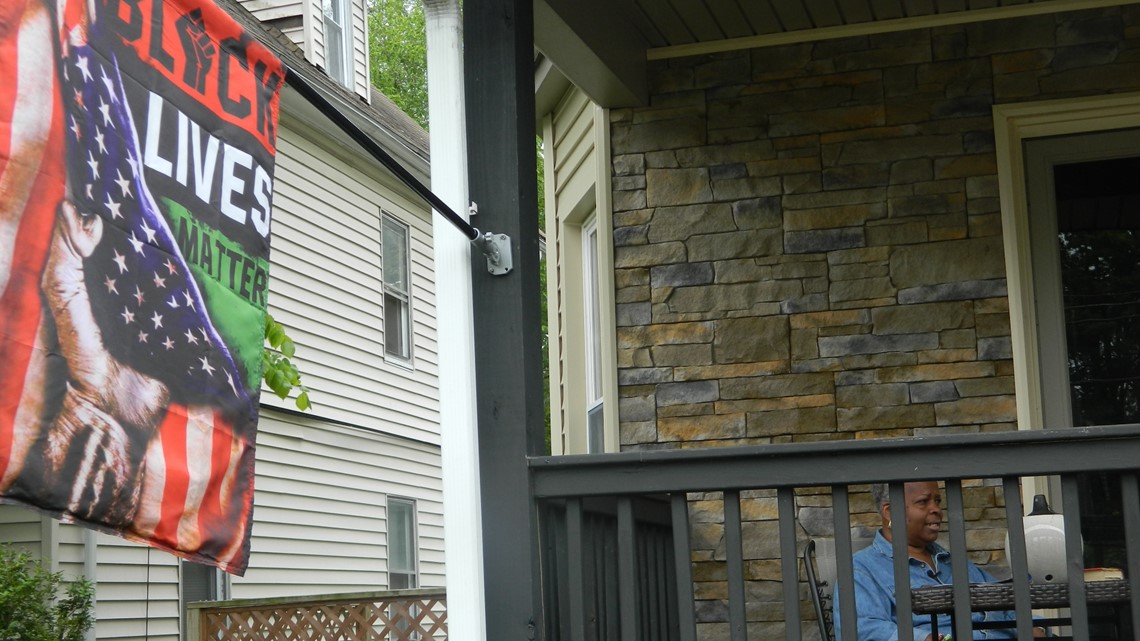
Martin sat down with FOX61 News to share her great, great, great grandmother’s story from enduring the chains of slavery to freedom.
Her name was Mary McKenzie Butts and she came to Hartford in 1923.
Mary McKenzie Butts was born into slavery on a plantation in Macon, Georgia, and died at the age of 101.
“The strength she had to be born into slavery… I just know that she had the fortitude to stay, to live, to grow,” Martin said as she recalled stories that Mary traveled North with four or five children.
While in the Greater Hartford area, Mary co-founded Hopewell Baptist Church, a prominent Black church now in Windsor, of which Martin is still a member.
Martin said Mary even received a citation from President Dwight D. Eisenhower for her 100th birthday.
“Because she survived, I’m here,” Martin said.
Martin said it’s hard not having access to documents and records of her lineage, but there are stories.
In her home, a portrait of five generations of women sits on display. At the center: Mary McKenzie.

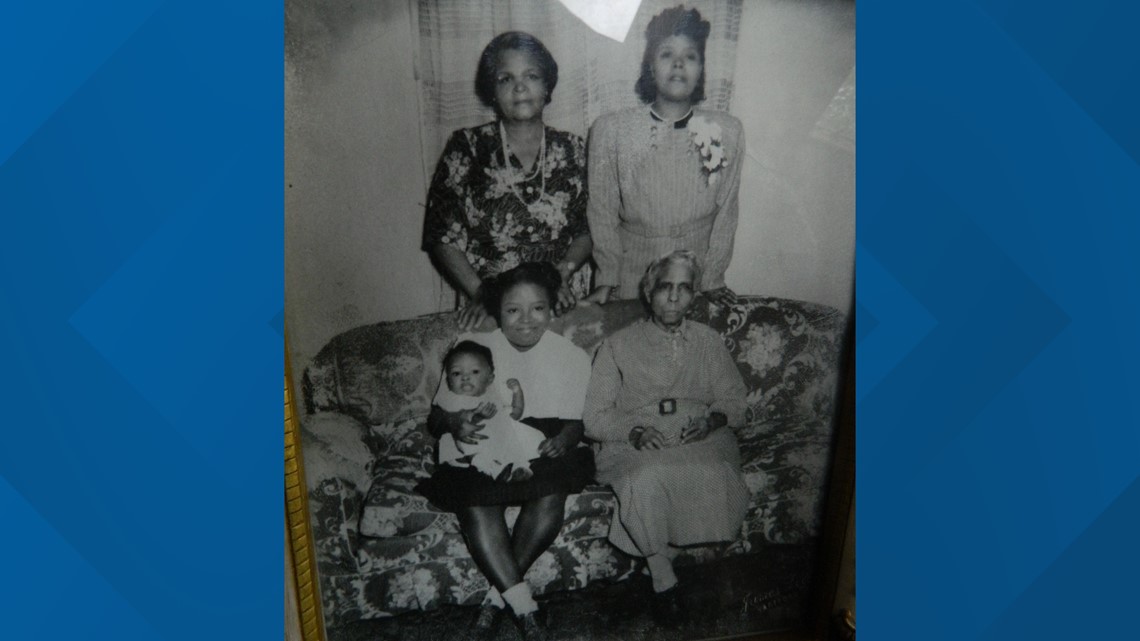
Her legacy and that rich family history live on, as Martin said she taught her own grandson about his great, great, great, great grandmother.
According to Martin, passing stories down over generations is what helped her know Mary, who died when she was 4 years old.
She remembered her mother telling her of times when Mary would sit by the window and go back in time to her childhood, yelling for horses to be moved.
When thinking of Juneteenth, Martin said it’s important to note that enslaved African Americans were freed in word and not deed.
“Although we celebrate Juneteenth, we need to celebrate all that comes with that date - all that came before and after,” Martin added.
Martin revealed that she struggled for years with determining her purpose. She later realized it was to be herself and share her history.
A significant finding that made her feel more connected to that history: Quilting.

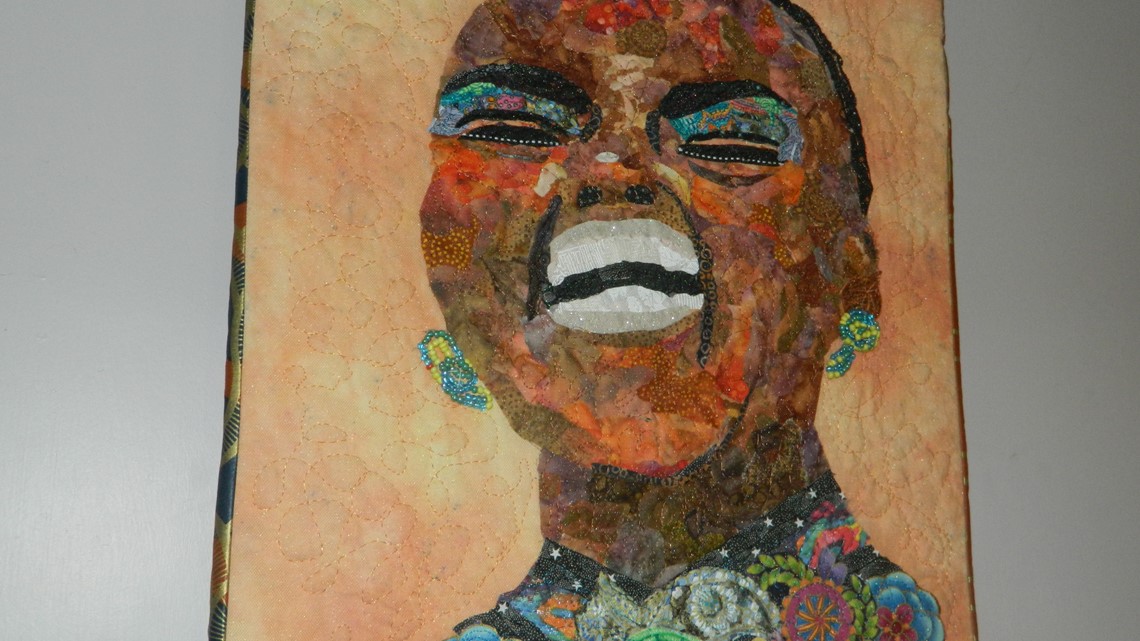
“I didn’t know that quilts were created to hide money, they were made to show the route to freedom,” she said. “We have a rich history tied into quilt making and I wanted to keep that up.”
After making bed quilts for family and art hangings that have been seen around the world, Martin said she realized the art form was developed out of necessity and it is what made it feel purposeful.
As the country continues its fight for equity, following a significant racial reckoning that was sparked by George Floyd’s death in Minneapolis in 2020, people like Martin remain angry, but hopeful.
“We have never been free. We [African Americans] have tried and tried, and we continue to try,” Martin said. “That’s what we are, we are a people who don’t give up. We’re smart, we’re intelligent, we’re here forever.”
Shaping the future

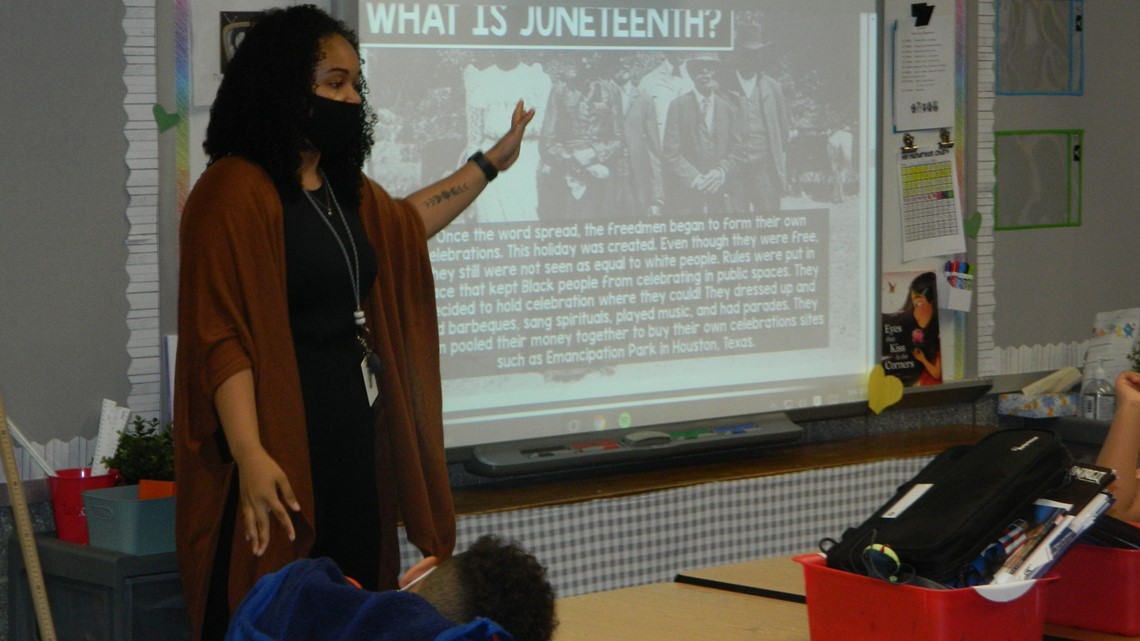
You can expect to see big Juneteenth celebrations all weekend long.
While some may be jubilant, similar to generations past, others are quieter – yet still making the same impact of commemorating the emancipation of enslaved people in the U.S.
Windsor Public Schools announced that its theme for Summer Reading 2021 is Juneteenth!
District officials said it’s a partnership with the Windsor Public Library and the Windsor Library Association.
During the program, students will explore books that celebrate Black Excellence and Black Achievement.
“All students can benefit from learning about Black History and Juneteenth,” WPS Director for Arts and Humanities, Bonnie Fineman said. “Black History is not just for folks of color. Black History is everyone’s history.”
According to Fineman, students of color constitute about 70% of the Windsor Public Schools district.
She said it is important that students feel represented in classrooms, as it pertains to reading and writing.
“It’s my responsibility to make sure that we are including all of our kids, that we are making all of our kids feel great and supported and represented,” she added. “There is a need to make sure that education is changing.
The program’s goal is to do just that.
Historians confirm that many educators today don’t know a lot about the African American experience. However, those at John F. Kennedy School have made it a priority to explore.
Principal Autumn Baltimore said students are receiving an equitable education, as the school expresses different cultures, people and genders every day.
“The fact that we have third graders, fourth graders, fifth graders saying ‘Hey, I would like to see myself in a book’ regardless of what self is, is really powerful and it’s our job to make sure we provide those resources so that they are able to be change agents for what they’re going to be learning,” Baltimore said. “When a student wants to learn and they’re engaged, then it’s highly effective practices going on.”

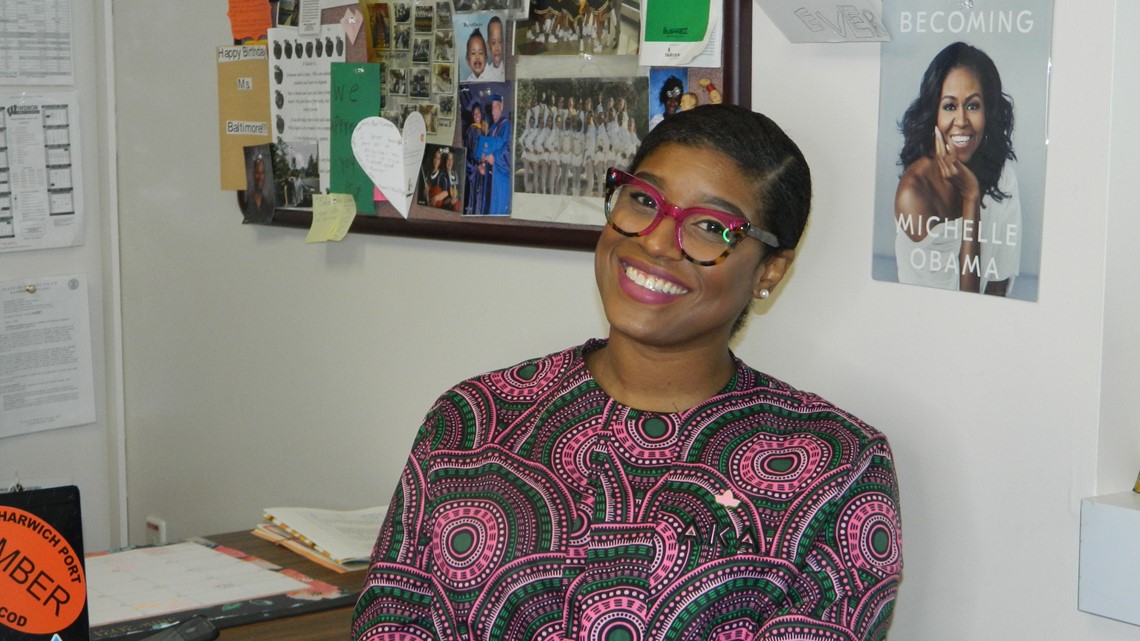
Mercedes Jones, a first-year teacher in a 4th-grade classroom, said while teaching Black history is empowering and her favorite topic, she didn’t learn about Juneteenth’s significance until college.
“Representation is just super important. It’s important for my students to know the people that look like them have made such impacts in history,” she said.
Fineman also noted that during her grade school years, topics like Juneteenth were left out of lessons.
“I don’t remember reading a single book by an author of color,” she said, adding that it wasn’t until enrolling in Black Literature courses in undergrad, that a whole world, as she explained, was revealed to Fineman.
Helen Nguyen, also a 4th-grade teacher, said these subjects need to be taught early because some students won’t get that higher education experience.
“We need in public schools -- especially in elementary and middle -- to talk about these things so that they’re informed, they know where they came from and the history that continues to repeat itself,” she said. “So, when things happen in the present, they know and connect to the history that it followed.”
Nguyen added that it can be a lot of pressure to cram so much information in, but her goal is to ensure there are no gaps in her lesson planning.
The school district’s efforts to increase diversity and inclusion have been paramount for students who don’t necessarily understand its significance.
Jones said she was once asked why their class was reading a book with Black people when it wasn’t February or Black History Month.
“It was shocking to me that they felt like there was a certain month or time that we could talk about groups of people,” she said.
According to Principal Baltimore, not only do the students need to know about Juneteenth, they want to. And the fourth graders told us themselves.

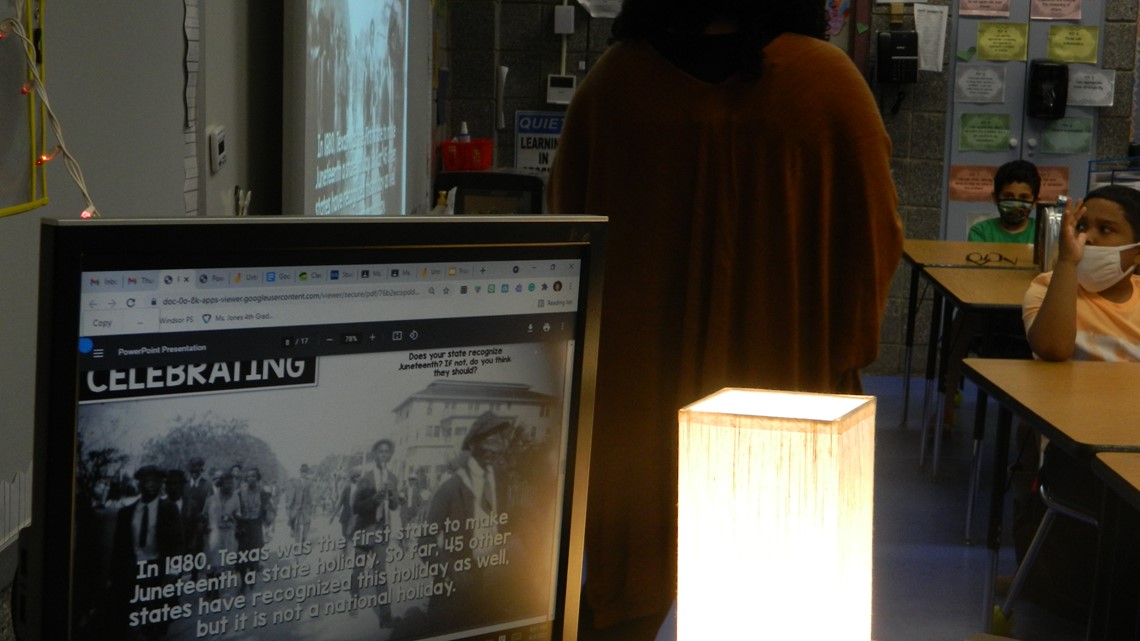
Elijah:
“Still today, a lot of Black people are being harmed because White people don’t think that they belong,” Elijah said. “I think everybody should celebrate that holiday to congratulate Black people, for being who they are.”
McKenzie:
“I didn’t know that some slaves were not free until two years after it was announced, so that made me upset,” she said. “Every culture’s different and we should learn about other people.”
She added that the reason it’s important to be culturally aware is so that you don’t offend your peers.
Her example: “If you walk up to someone with a hijab on and then just pull it off, they will feel offended and it will be very rude.”
Macy:
“Juneteenth is the day that slaves became free and that is really important because no one should ever have to go through what they went through in their entire life,” Macy said.
Macy added that it makes her happy to see characters and people throughout history who look like her.
“I like to see what they’ve gone through and what I might go through when I’m older,” she said. “I’ll know how to handle it.”
JFK’s Literacy Coach, Marguerite Smith said the town’s initiative is crucial for the future.
Although generations of students didn’t learn about Juneteenth and many other significant points throughout Black History in the classroom, Smith said they are now raising kinder, gentler, and more knowledgeable students, who will grow to accept everyone for who they are.
In addition to the summer reading program, the district furthered its commitment to highlighting Black excellence and achievement with a ‘Celebrate Juneteenth’ logo designed by a Windsor High School junior, DeAndre Satterwhite.
The logo incorporates colors from African flags, a heart in the center with two hands to show that we can lift each other up. It is featured on a billboard along I-91.


To launch its Juneteenth-inspired 2021 summer reading program, Windsor Public Schools’ families are invited to celebrate Juneteenth at the Wilson Branch Library on June 19.
The community will enjoy read-a-louds, African dance and drum performances, giveaways and more.
Additionally, a movie night kickoff will be held on June 25 at the Main Branch Library, where families will watch a movie on the green and students can receive free summer reading books.
For more information on the summer reading program and activities, click here.
'I Come From...' By: Nicole Young
Me.
The woman who stands before thee
Was birthed of the Motor City.
Of a people proud of their humble beginnings.
A family, by way of the Middle Passage, with feet firmly planted on American soil for at least six generations deep.
Co-creating to a culture that is uniquely our own and a part of so many others’ stories.
I Come From…
By way of farms in the deep South. By way of Alabama, Mississippi, Texas, and Arkansas.
Those who made their way to Detroit, Michigan via the Great Migration.
Those looking for upward mobility through jobs on the assembly line.
Grandfathers and great uncles who each touched Cadillacs, Corvettes, Mustangs, Enclaves, and Oldsmobiles before they hit the highway terrain.
Grandmothers and great aunts who worked as postal carriers, bank tellers, and branch managers while also tending to the needs of being mothers. Caring for generations of children, grandchildren, nieces, nephews, cousins, play cousins, and neighbors’ kids.
Cooking big meals every night after working 10-12 hour days and made sure to make time to tuck their kids in at night and make sure that the children of their village made it home safe to then be embraced by their own parents’ arms.
Each also holding side hustles: pressing hair, running lottery numbers, babysitting, baking cakes and pies for after church dinners and frying fish for Fridays.
The sweat shed throughout these centuries is only a manifestation of the labor put forth by a lineage unafraid of what’s left behind.
I Come From…
Sweet potato pie.
Roast with potatoes. Skin on.
Collard greens.
Black Eyed Peas.
Fried chicken.
Catfish.
Mac and cheese.
Sweet tea.
Buttermilk Biscuits with honey.
Peach cobbler.
Coconut cake.
Pecan Pie.
All Southern decadence that found their way north.
Starting on the tables of families who descended from
Those once enslaved.
Finding our own way to be
Tending to the spirit
Feeding the soul.
Foods that have now found their way to almost everyone’s holiday tables.
Food that will continue to be shared by teaching others
The secret ingredients passed on from our mamas, our mamas’ mamas, and our mama’s mama’s mamas.
I Come From…
An Afro-Centric education. A proud Detroit Public Schools graduate who learned about the Black Panthers, Malcolm X, Rosa Parks, Emmitt Till, The Jubilee Singers, Freedom Summer, Brown vs. Board of Education, Barbara Jordan, Shirley Chisholm, and many other important Black figures from grade school lessons on. I never had to question or wonder about my history, about America’s history as my teachers ensured that I knew who I was, where I came from, and who I could become.
I Come From…
A loving and supportive family who wanted nothing
But to help me realize my dreams.
My mom and dad, both who have since passed on
Worked multiple jobs as custodians, cooks, stadium concession workers,
And school paraprofessionals
As their dreams would come true if their first born
Was able to reach for the stars.
---
HERE ARE MORE WAYS TO GET FOX61 NEWS
Download the FOX61 News APP
iTunes: Click here to download
Google Play: Click here to download
Stream Live on ROKU: Add the channel from the ROKU store or by searching FOX61.


